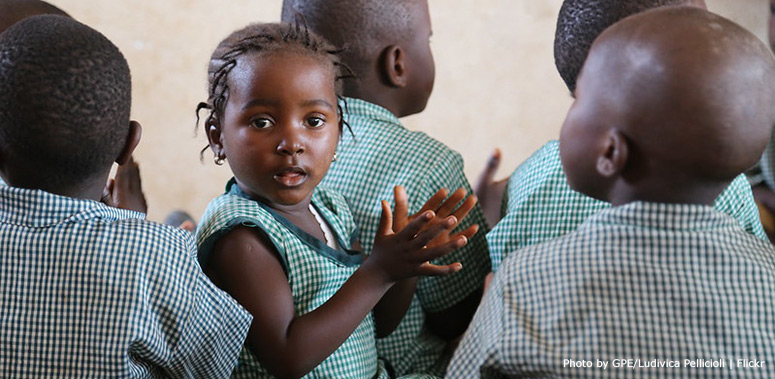Early childhood education financing
Project summary
The first five years of a child’s life are among the most critical for their long-term development. Yet spending on pre-primary schooling internationally is very low. Since 2017, we have been working with Theirworld, a global children’s charity committed to ending the global education crisis and unleashing the potential of the next generation. Theirworld have been campaigning for 10% of education aid budgets to be spent on pre-primary education.
To inform Theirworld's advocacy, the REAL Centre has been analysing donor spending on pre-primary education every year to track progress. Our analysis shows a chronic lack of funding from global leaders is leaving young marginalised children at risk of falling even further behind.
Our 2017 report revealed that spending on pre-primary education remains consistently low, with donors committing 37 times more to post-secondary education.
In 2018, we revealed that aid to early childhood development had increased, yet this had been almost completely due to large increases in health and nutrition. Only 1% of early childhood development aid was going to pre-primary education.
Our analysis in 2019 revealed that 16 of the top 25 donors to the education sector had either given nothing or reduced their previous spending on pre-primary education since the introduction of the SDG targets.
Our 2021 report shows that 8 in 10 of the world’s poorest children – almost 50 million girls and boys – are missing out on vital pre-primary education because of a chronic lack of funding. Spending on pre-primary schooling accounts for less than 1% of the international community’s aid to education – equivalent to just 34 cents per child, per year. But of the world’s top 30 donors to education, 8 do not spend a single cent on pre-primary education.
Our analysis in 2022 warns of a continued chronic lack of funding by global leaders. Just 1.2% of the global education aid budget goes to early childhood education and our analysis suggests inequality sets in before children start school.
Analysis in 2023 showed that international aid for pre-primary education has fallen further behind an agreed 10% spending target since the COVID-19 outbreak. Our research highlights “continued, chronic” underfunding of pre-primary education in many of the world’s poorest nations, after years of slow progress and pandemic-related cuts.
Our latest analysis in 2025 reveals that the proportion of global education aid being committed to early childhood education – which was already well below international targets – has started to fall.
Research team
Principal Investigator: Professor Pauline Rose
Co-researcher: Asma Zubairi
Duration
2017 to date
Funder
Publications
Critical Crossroads: An updated scorecard on donor funding to pre-primary education
Zubairi, A. and Rose, P. 2025 A Theirworld Report
• Report summary
A turning point? An updated scorecard on donor funding to pre-primary education
Zubairi, A. and Rose, P. 2024 A Theirworld Report
A diminished priority: An updated scorecard on donor funding to pre-primary education during Covid-19
Zubairi, A. and Rose, P. 2023. A Theirworld Report
One-Year update: A better start? A progress check on donor funding for pre-primary education and early childhood development
Zubairi, A. and Rose, P. 2022. A Theirworld Report
A better start? A progress check on donor funding for pre-primary education and early childhood development
Zubairi, A. and Rose, P. 2021. A Theirworld report
Leaving the youngest behind: Declining aid to early childhood education
Zubairi, A., Rose, P. and Moriarty, K. 2019. A Theirworld report
Donor scorecard. Just beginning: Addressing inequality in donor funding for Early Childhood Development
Zubairi, A. and Rose, P. 2018. A Theirworld report
- Key messages and report summary
- Appendix 1: Donor Profiles: World Bank and UNICEF
- Appendix 2: Methodology
Bright and early: How financing pre-primary education gives every child a fair start in life. Moving towards quality early childhood development for all
Zubairi, A. and Rose, P. 2017. A Theirworld report
Blogs
Global aid to early education rises, but are donors really committed?
Justin van Fleet, UNESCO World Education Blog, 22 April 2024
G20 leaders need to step up to the mark in investing in early childhood education for the world’s poorest children
Pauline Rose and Justin van Fleet, UNESCO World Education Blog, 17 May 2023
Combining monitoring and advocacy for a 10 per cent spending target on pre-primary education
Pauline Rose and Asma Zubairi, UKFIET, 12 April 2023
Aid to pre-primary education: the gap between rhetoric and reality
Pauline Rose, World Education Blog, 4 April 2019
Opinion: The sharp decline in aid to early childhood education is leaving the youngest behind
Pauline Rose and Justin w. van Fleet, Devex, 4 April 2019
Education needs more funding as part of early childhood development to leave no one behind
Pauline Rose, Global Partnership for Education, 25 April 2018
Tracking of aid to early childhood development needs to improve
Asma Zubairi, UNESCO World Education Blog, 12 April 2018
Media
New era of aid cuts and conflict threatens educational lifeline of youngest learners
Faculty of Education, 13 May 2025
Underfunding to blame for slow progress, cuts in basic education
The East African, 19 June 2023
Pre-primary education “chronically” underfunded as richest nations drift further away from 10% aid goal
Faculty of Education News, 17 May 2023
Richest nations drift further away from 10% aid goal for pre-primary education
University of Cambridge News, 17 May 2023
Act for early years: A call for a global movement to support the world's youngest children
Theirworld, 12 April 2023
World’s poorest children missing out on early childhood education
Theirworld, 16 November 2022
World’s poorest children missing out on ‘crucial’ early childhood education
Faculty of Education News, 14 November 2022
20th Anniversary Special #1: How do you start a charity?
Theirworld Better Angels podcast, June 2022
Theirworld’s mission to give every child the Best Start in Life
Theirworld, 13 May 2022
Theirworld report shows almost 50 million of the world’s poorest children miss out on pre-primary education
Theirworld, 21 July 2021
World's poorest children missing out on pre-primary education
University of Cambridge Faculty of Education News, 21 July 2021
About 80% of poorest children lack early years education
The National (news from the Middle East), 21 July 2021
World's poorest children missing out on early years education
Nursery World, 21 July 2021
Africa: Innovation in early learning starts with political will and investment
Justin van Fleet, allAfrica, 4 April 2019
Other resources
- Education and early childhood, The Key
- Education and early childhood development & COVID-19, The Key
- Education and economic growth, The Key


